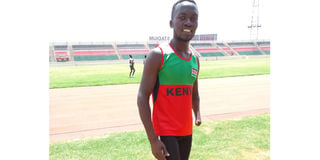Beyond academics: How RTI fosters a supportive, inclusive learning environment
Sponsored by Railway Training Institute

Railway Training Institute student and para-athlete Joseph Kiptanui.
By Evans Ongwae
The Railway Training Institute (RTI) on average releases 1,500 graduates to the industry annually. These are graduates with competitive qualifications, having been put through comprehensive curricula for various courses grouped under Engineering and Technology, Business, Railway and Marine Transport and Logistics.
Games and sports
At RTI, learners have the opportunity to also participate in diverse sports and games. They are also free to join various extra-curricular societies. This is all part of campus life, and it enables students to develop skills beyond academics.
The institute thus provides sporting and games facilities to enhance productive usage of time. Football, hockey, rugby, volleyball, netball, chess, and badminton are available for any willing student to participate up to advanced competition levels. In last year’s Kenya Technical Training Institutions Sports Association (KETISA) games, the institute emerged third overall out of 13.
Clubs and societies
For the well-being and spiritual guidance of students, RTI allows them to form their own clubs. Examples are the wildlife, engineering drama, and environmental clubs, as well as a choir. Students can also join available religious societies for their spiritual nourishment.
The institute’s Drama Club is doing well, and has participated in a number of festivals, including at the national level. The Engineering Club, on the other hand, has contributed innovative ideas to railway development activities in the country. Their contribution was incorporated during the recent rehabilitation works on the metre gauge railway (MGR) line.
Disability mainstreaming
RTI has disability mainstreaming policies, and provides equal chances to all qualified students to enrol in its programmes. The institute has a vibrant Gender and Disability Committee that addresses mainstreaming activities. Students who have a form of disability are not left behind in sports, and some of them compete in international tournaments.
For example, student and para-athlete Joseph Kiptanui will represent Kenya in the Tunis 2024 Grand Prix scheduled for March 5-7, 2024. A talented athlete, Kiptanui is studying for a Diploma in Electrical Engineering (instrumentation option). His case demonstrates RTI’s success in mainstreaming disability, promoting talents, and fostering a supportive learning environment.
Student health
RTI has a health centre with competent medical staff who take care of students when ill. Critical cases are referred to government hospitals near the institute or as guided by the guardians or sponsors. Kenya Railways has a standby ambulance that serves the institute in case of emergencies that require urgent transfer.
Corporate Social Responsibility
In exercising Corporate Social Responsibility, RTI participates in tree-planting events, and has managed to keep its environment green and conducive for learning.
Last year on October 13, which is the National Tree-Planting Day declared by His Excellency President William Ruto, RTI students, staff and stakeholders planted over 1,000 seedlings. In addition, the institute keeps the surrounding neighbourhood free of garbage, through clean-up exercises.
Visit https://www.rti.ac.ke/ for more information and how to join RTI. Also, details of the courses on offer for the May and September 2024 intakes are available here.


